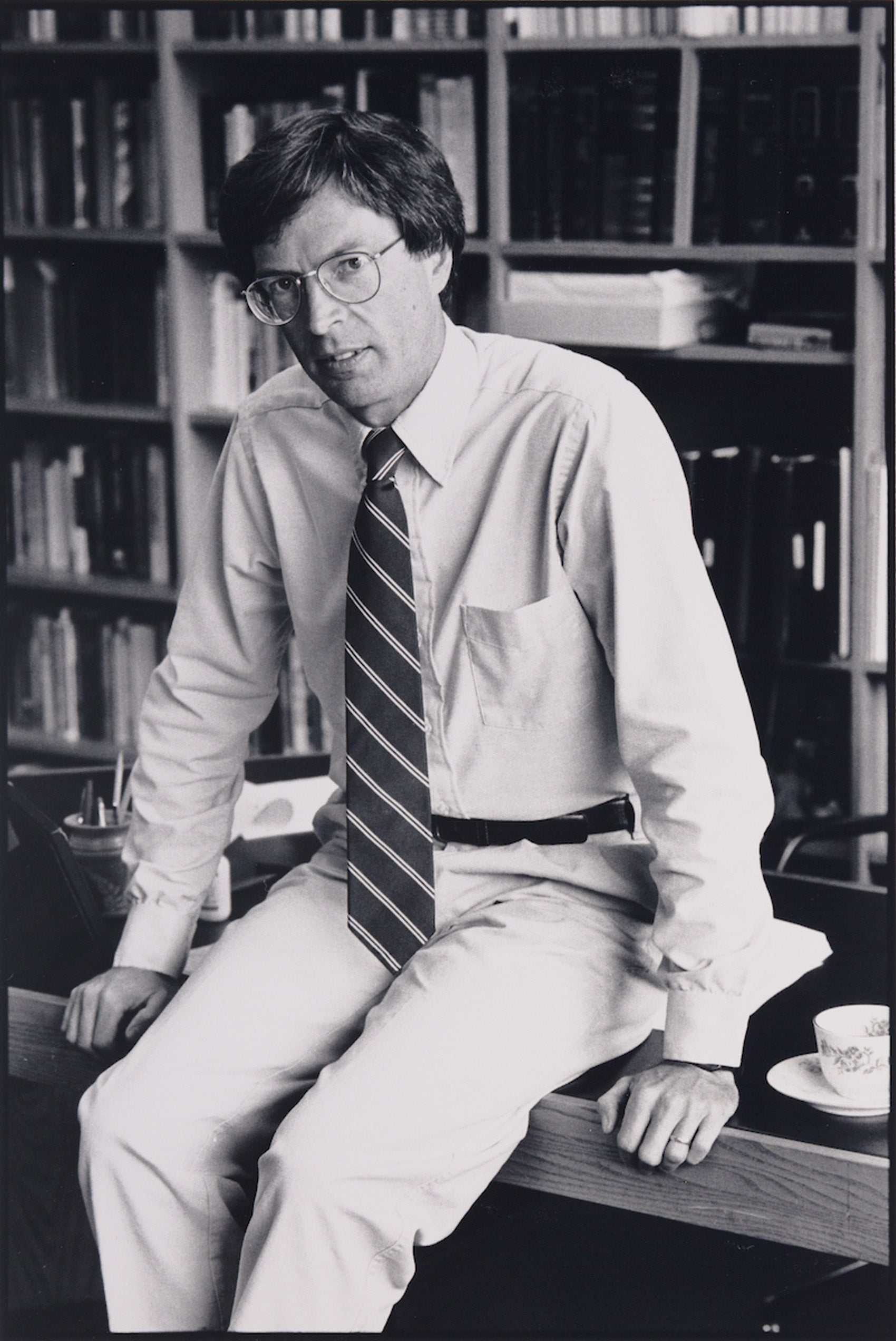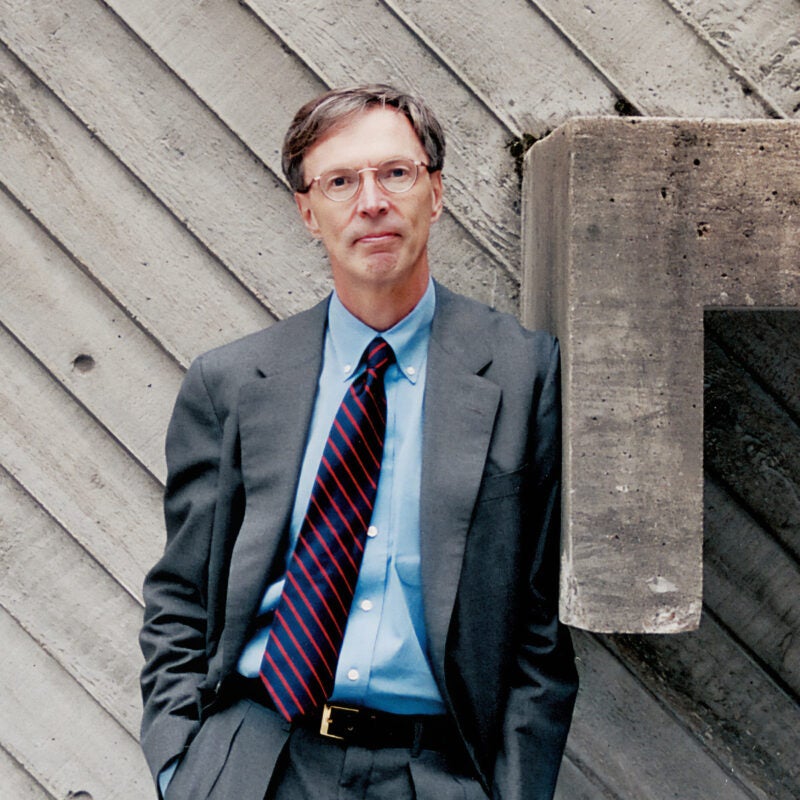Richard H. Fallon, Jr., an eminent scholar of constitutional law and the federal courts system, and a revered member of the Harvard Law community, died July 13. He was 73.
In messages to the law school community, Harvard Law School Dean John C.P. Goldberg shared the “heartbreaking news” that Fallon had passed after being diagnosed with an aggressive form of cancer earlier this summer.
Goldberg detailed Fallon’s countless scholarly contributions and credited Fallon with influencing the thinking and writing of so many, including his own.
“Dick was not only an extraordinary scholar, teacher, and citizen, but also a pillar of this community. Even before I got to know him personally, he was for me the epitome of how to write, think, and teach about law, legal theory, and philosophy,” wrote Goldberg. “Over his many decades in the classroom, he modeled excellence, curiosity, respect, and humility. … I consider myself beyond fortunate to have had the chance to work with our brilliant and exemplary colleague even as I am overwhelmed by sorrow for his loss.”
News of his passing inspired an outpouring of tributes from colleagues and former students praising and expressing gratitude for his many contributions to Harvard and the law.
“Dick Fallon invariably brought his sterling intellect, unparalleled clarity, and personal kindness to every interaction — from our first meeting as fellow law students over 40 years ago through his comments on a draft of mine this spring,” wrote Martha Minow, the 300th Anniversary University Professor, Harvard University and former dean of Harvard Law School. “So many of his scholarly works rightly became instant classics; so many of his students — in the law school and in the College — regularly draw on what he taught them and how he taught them: with wisdom, broad range, and humility. The law school and the world of law is stronger because of his judicious, illuminating efforts. His absence will be keenly felt by all lucky enough to know him.”
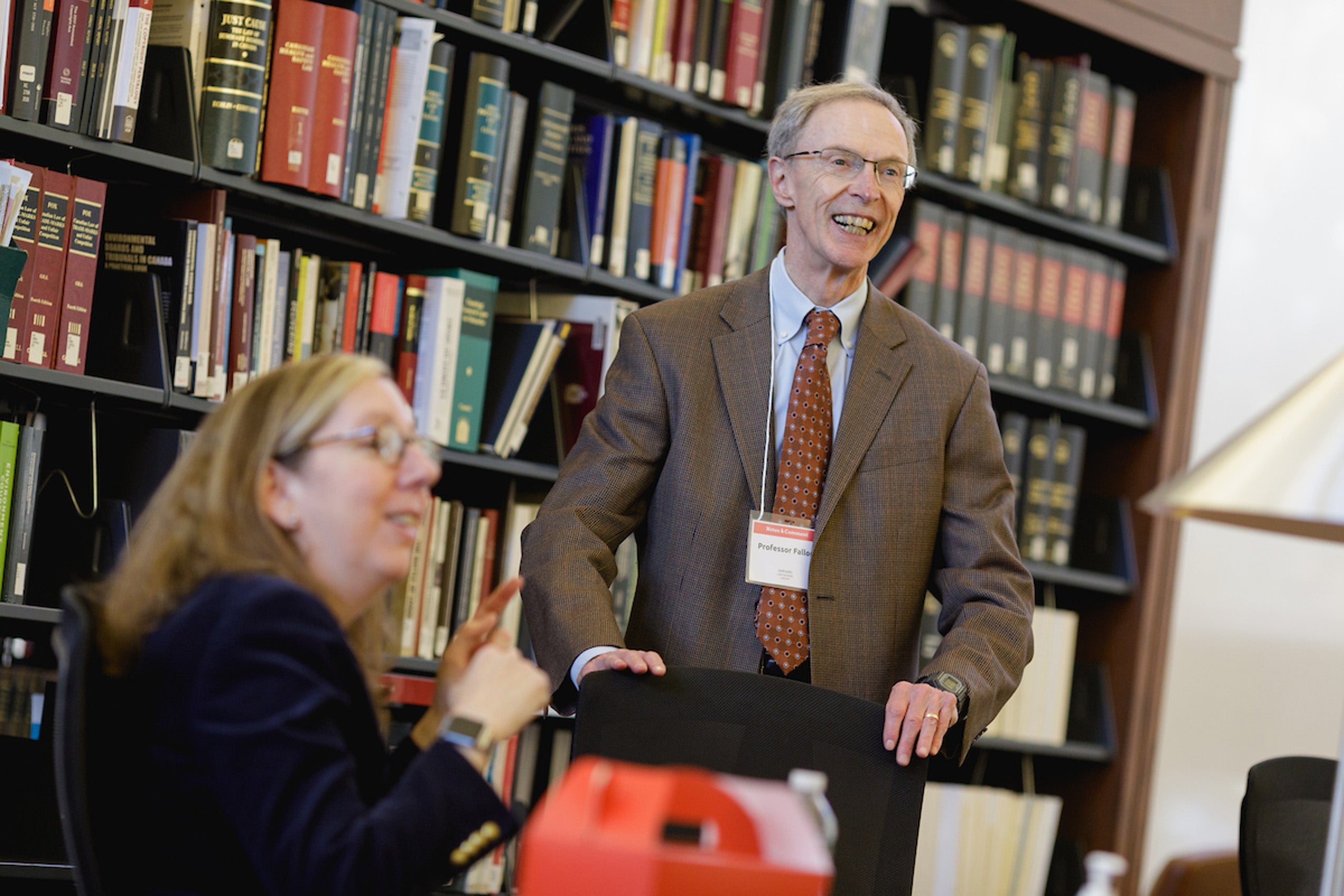
The author of dozens of important scholarly works, Fallon applied his constitutional expertise to explaining the development of the United States Constitution, the history of constitutional law, and current issues that influence critical interpretations of the foundational document of U.S. law and society.
He had just completed his latest book, “The Changing Constitution: Constitutional Law in the Trump-Era Supreme Court,” due out this September.
Fallon joined the Harvard Law School faculty in 1982 as an assistant professor, and was promoted to full professor in 1987. In 2004, he was named the Ralph S. Tyler, Jr. Professor of Constitutional Law. During his tenure at Harvard, he also served as an affiliate professor at Harvard College teaching a popular undergraduate course, Government 1510: “American Constitutional Law.”
From her days as a law student through her more than 33 years on the faculty, Carol Steiker ’86, the Henry J. Friendly Professor of Law, said Fallon had always been part of her Harvard Law School —first, as a teacher and mentor, and later as an impactful scholar, a generous colleague and an institutional citizen.
“Dick was an assistant professor when I was a law student at HLS in the mid-1980s. I had the privilege of taking Federal Courts with him, which was both fascinating and a bit scary, given how smart he was and how smart I wanted him to think I was,” she wrote. “Dick then hired me and my classmate Elena Kagan [’86] as research assistants to read his tenure piece — this was back in the days of THE (singular article) tenure piece — and to suggest edits. This, too, was scary in the same way. But it was also deeply gratifying to be taken seriously by such a serious scholar and to be invited into an intellectual dialogue with him. I don’t think it is coincidental that Elena and I both became legal academics ourselves. Dick made that path seem weighty and important, and he also made it seem fun and full of opportunities for vigorous intellectual engagement.”
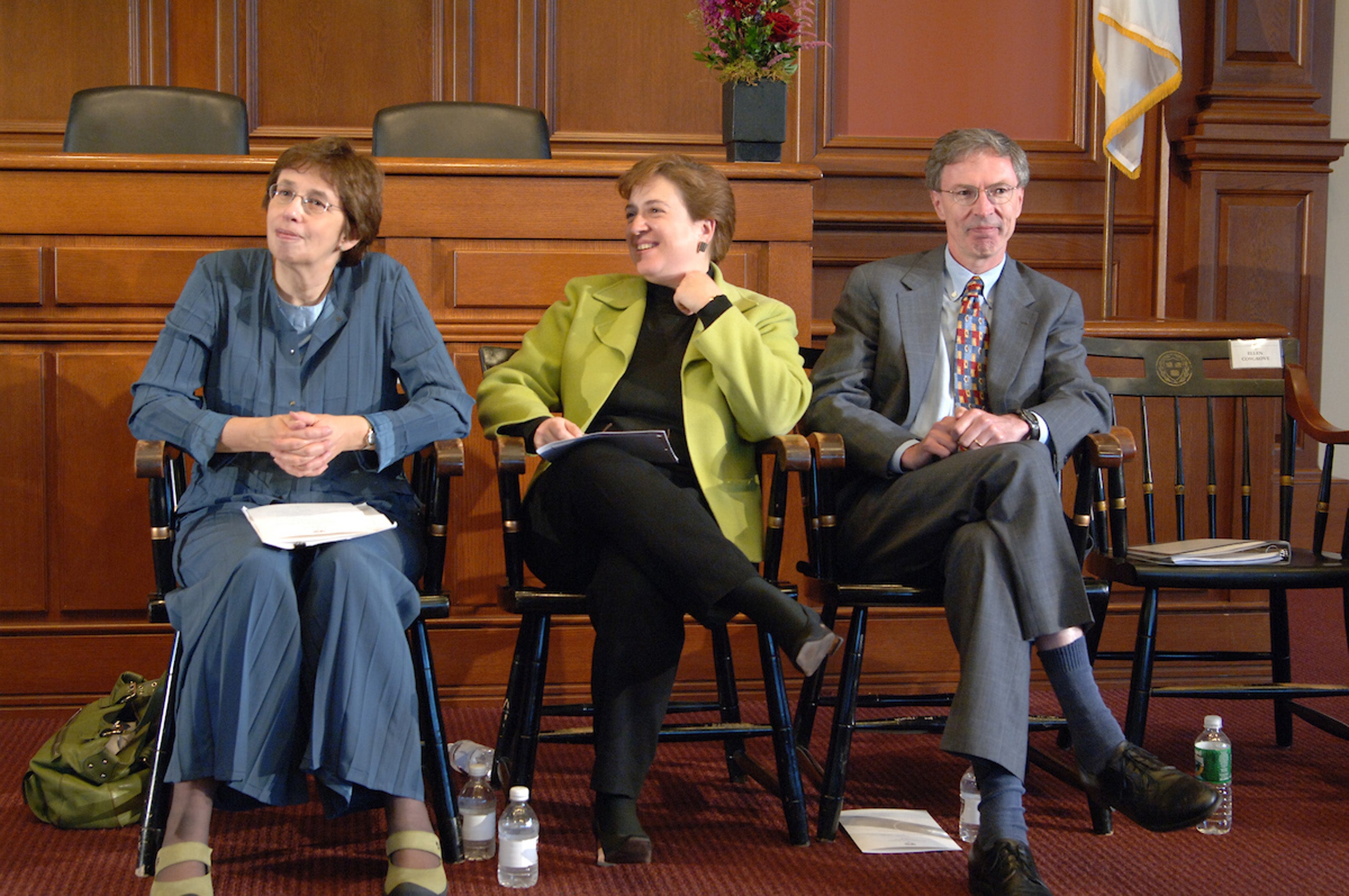
Harvard University Provost John F. Manning ’85, and former dean of Harvard Law School, said Fallon altered the trajectory of his career. “Dick Fallon taught me Federal Courts forty years ago, and his intellectual clarity and integrity made me love the subject and changed the course of my career. His generosity of spirit, as much as his brilliance and his tireless devotion to getting it right, made him a superb teacher, scholar, and colleague. He was also a beloved friend. I know that he will live among the greats in Harvard Law School’s history.”
“If it were not for Dick Fallon, I don’t think I would have wanted to become a law professor,” wrote Nikolas Bowie ’14, the Louis D. Brandeis Professor of Law. “Much of what law professors do is teach and research, and when I was a student, the teaching part looked fantastic. I imagined that leading discussions and helping students learn would be fun and rewarding. Research seemed like a lonely downside to the job. But then I had the incredible fortune of working as Professor Fallon’s research assistant. And from that vantage point I watched him slowly, methodically, and poignantly set the standard for what the ideal mentor looks like. Even though Professor Fallon was celebrated around the world for the vibrance and unusual depth of his ideas, he developed new ones collaboratively — treating his students as peers and taking their ideas as seriously as he took his own. Taking ideas seriously did not mean he didn’t challenge them; he was a quietly incisive critic who could uproot an entire article with a single well-placed question. But like a community gardener, he understood that thriving does not mean standing alone but rather helping those around him flourish; that growing fragile ideas means weeding bad ones at their roots; and that there are good seasons and bad, but there are no shortcuts to making something that lasts for generations other than integrity and a commitment to principle. Professor Fallon taught me that research is growth. And as I worked with him to develop his ideas while seeing my own ideas take root, I learned there is no more fulfilling job than enriching the lives of others as he did every day.”
In 2016, Fallon was named the Story Professor of Law, a professorship once held by the late Harvard Law School Professor Daniel J. Meltzer ’75, with whom Fallon served as a longtime collaborator co-editing the legendary treatise, Hart & Wechsler’s “The Federal Courts and the Federal System.”
The Association of American Law Schools recognized Fallon in 2021 with the Daniel J. Meltzer Award, which recognizes a professor of federal courts who exemplifies over the course of their career “excellence in teaching, careful and ground-breaking scholarship, engagement in issues of public importance, generosity as a colleague, and overall contribution to the field of federal courts.”
Upon receiving the recognition, Fallon said: “I was especially touched, as well as honored, to receive an award named for Dan Meltzer, who was my close friend and cherished collaborator. I have never known a more admirable human being.”
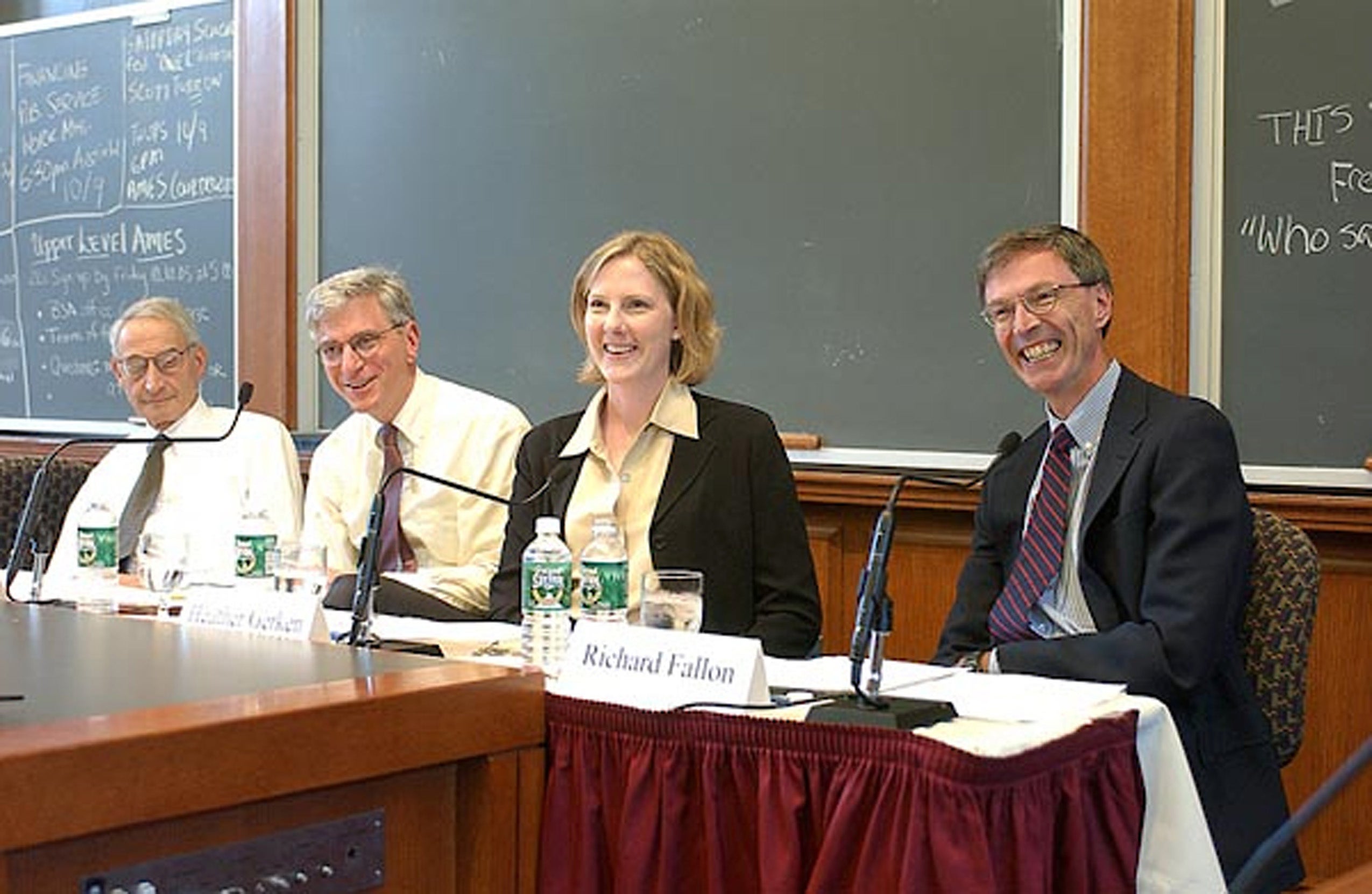
In 2021, U.S. President Joe Biden appointed Fallon to serve on the bipartisan Presidential Commission on the Supreme Court of the United States. The 36-member committee, which included seven Harvard Law faculty members and nine alumni, was tasked with studying the origins of the debate around Supreme Court reform, the Court’s role in the American constitutional system, and the legality and desirability of various reform proposals.
He was twice honored by the school’s graduating class with the Sacks-Freund Award for Teaching Excellence, in 2001 and 2006. He mentored countless grateful and devoted students who have gone on to leading roles as scholars, judges, and partners in law firms.
Fallon studied history as an undergraduate, graduating in 1975 from Yale, where he also earned a J.D. in 1980. He also earned a B.A. in philosophy, politics, and economics in 1977 from Oxford University, which he attended as a Rhodes Scholar. He served as a law clerk to Judge J. Skelly Wright of the U.S. Court of Appeals and to Supreme Court Justice Lewis F. Powell.
Randall L. Kennedy, the Michael R. Klein Professor of Law at Harvard, wrote: “Dick Fallon was my colleague here for over forty years. I knew of him before I arrived because we went to the same law school — Yale — and clerked for the same court of appeals judge — J. Skelly Wright. He was tremendously helpful to me. He was friendly. He was encouraging. He offered constructive criticism. He was full of wise counsel. He represented the best of Harvard Law School.”
In addition to his recent book and his casebook co-editorship, Fallon’s other scholarly works include “The Nature of Constitutional Rights” (Cambridge University Press, 2019), “Law and Legitimacy in the Supreme Court” (Harvard University Press 2018), “The Dynamic Constitution” (Cambridge University Press, 2d ed. 2013), and “Implementing the Constitution” (Harvard University Press, 2001), as well as serving as a co-editor of Constitutional Law: Cases-Comments-Questions (13th edition 2020).
In 2019, his book “Law and Legitimacy in the Supreme Court” received Georgetown’s Center for the Constitution’s Thomas M. Cooley Book Prize, which recognizes “exceptional books written that advance our understanding of, and commitment to, our written Constitution.”
A devoted son of Maine, Fallon grew up in Augusta, where he attended Cony High School, and, for his first job out of college, he worked for a member of the House of Representatives .
In 2010, he wrote a novel, “Stubborn as a Mule,” set at a small liberal arts college in his home state. In an interview in the Harvard Law Bulletin, he said a scene came to him in the middle of the night and over six weeks he penned a comic romp about a school president, a conservative economist, who tries to unseat a Republican Senate moderate (and Harvard Law grad).
“HLS can be grateful for the more than forty years in which Professor Fallon wrote, taught, mentored, counseled, and led with extraordinary distinction,” said Goldberg. “His passing leaves a hole in our community that cannot be filled.”
